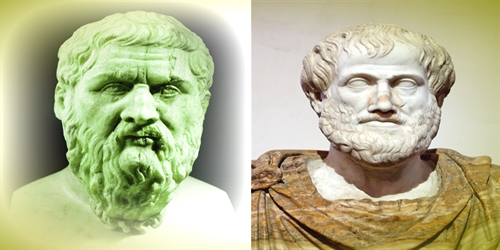Difference between Aristotle and Plato

When we look back at the Greek times, forenames like Socrates, Aristotle, Plato, and many other philosophers instantly click our mind. In the history of mathematics and philosophy, Aristotle, and Plato both worked a lot.
Plato
Plato was born circa 428 B.C. in Athens and got education under Socrates. His notable works are: Theory of Forms, Platonic Idealism, Platonic Realism.
Aristotle
Aristotle’s expected date of birth is 328 B.C till 384 B.C in Stageira, Chalcidice. He was a renowned philosopher, writer, teacher, and mathematician. Under Plato, he learnt a lot. His notable works are: The Golden Mean, Reason, Logic, Biology, Passion.
Aristotle Vs Plato
Relation
Aristotle and Plato had the relation of a teacher and student. So, it is anticipated that student will definitely follow his teacher. Aristotle followed Plato, but with different perspective. They both took atmosphere of human and functions as their major projects and gave philosophies on it.
Sketch of Art
In his book, Republic ix, Plato says art is the imitation of world. It’s completely the refection of actual picture as it misleads the minds of people. Theory of imitation and theory of forms are closely dealt in it. Whereas, for Aristotle art is undoubtedly an imitation in which an artist puts his creativity while making it. So, he admired art as compared to his mentor Plato. He had different opinion on art as compared to his teacher because he appreciated art.
Vision on Soul
According to Plato, Soul is the guide to body and mind; he compares this idea with chariot which is driven by two horses at a time. Plato says some people never achieve the right direction throughout their life and conjure their bodies and minds into prohibited activities. He divides Soul into emotion, desire, and reason. According to Plato, true knowledge is acquired through reason and soul is the part of reality.
Whereas, Aristotle is of different view, says that human thinking can be inactive, and it can also be creative. One-part deals with the physical needs of a man and the death of body while the other one compromises the identical side of the soul which will return to GOD. Plato gave his own realism by mixing reason, logic, and biology passion created realism.
Negation of Aristotle’s view on Functionality of Humans
According to Plato the perfect form of ethics, moral and character cannot be achieved. If the whole society and every individual contribute to ensure justice and equality whole heartily even then the perfection cannot be achieved.
Aristotle had a different opinion about this thought. According to Aristotle, “Injustice is the dominant power over justice”. Aristotle argues his statement by saying that injustice can never be the source for development of an ideal state; rather it spoils the nation. He opines that human function plays a vital role in the development of an ideal state because it is man who, by his character, actions, attitude, thinking, and knowledge shapes the model of an ideal society.
Philosophy of Reaching Pleasure
According to Plato, Ultimate happiness can be achieved through true virtue, character, and love for God. True happiness can be acquired when whole society, from one person to another person, fulfils his or her functions and adopts moderation, self-control, virtuosity and true love for GOD; then ultimate happiness will definitely knock the door.
Whereas Aristotle mainly focused on the happiness of an individual rather than a society. He believed that it entirely depends on the person. For him, true happiness can be achieved if an individual himself fulfils his functions of living and practices virtues.
Views on Ethics
Wisdom was the basic and most important virtue according to Socrates and Plato. It is the master of all good and encompasses all virtues in it. Virtues could be taught to anybody through knowledge. To tell a person difference between right or wrong will lead to making of a virtuous man. Plato’s philosophy was theoretical in nature.
For Aristotle, wisdom was a virtuous goal that could be achieved with effort and diligence. It appeared neither automatically nor as a unification of other virtues. Virtues are the basis of happiness, but it could be fully achieved with help from other social constructs. Aristotle gave a practical insight into Plato’s philosophy.
Contribution to Science
Plato wrote about mathematics, geometry, physics. His works were exploratory and theoretical in nature. His writings on biology and astronomy did not add anything new to the already existing pool of knowledge existing at that time.
Aristotle’s writing was practically applicable. He is considered one of the first true scientists. He developed a scientific method to observe the universe and noted his observations. He contributed to mathematics, physics, and geometry with new ideas. His works were extensions of already existing ideas. He classified all types of life and contributed to zoology and botany. His geocentric approach in astronomy became an impetus for the works of Copernicus.
Achievements
Plato was known for his knowledge and contribution in the field of Philosophy and Mathematics. Plato had a staunch belief in unity, and he made the people realize about the importance of unity. He was also a spiritual teacher.
Aristotle had a great contribution to the field of zoology, physics and poetry. In fact, he is the inventor of Classification system which is still in use. He also had great love for music.
Conclusion
Aristotle and Plato appreciated art with different perspectives, gave different philosophies on human functioning, happiness. Their motive was the same: to develop a good sense of reasoning in people. Who was better in your opinion?


Leave a Reply